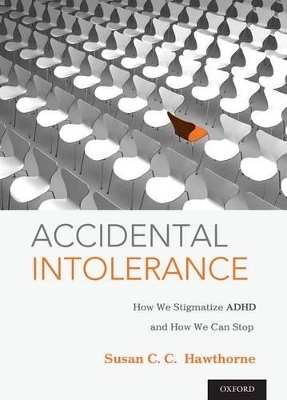
Accidental Intolerance
How We Stigmatize ADHD and How We Can Stop
Seiten
2013
Oxford University Press Inc (Verlag)
978-0-19-997738-3 (ISBN)
Oxford University Press Inc (Verlag)
978-0-19-997738-3 (ISBN)
Accidental Intolerance shows how medicine, science, and society jointly -- though not intentionally-stigmatize ADHD -- diagnosed people, while offering them few options. It also explores ways we can change our concepts and practices to improve factual understanding of ADHD, open alternatives to affected people, and reduce intolerance.
In Accidental Intolerance, Susan Hawthorne argues that in the past few decades, our medical, scientific, and social approaches to ADHD have jointly -- but unintentionally-reinforced intolerance of ADHD-- diagnosed people. We have packed social values, such as interests in efficiency and productivity, into science and medicine. In turn, scientific results and medical practice reinforce the social values, and stigmatize those considered "disordered." Overreliance on the DSM model of ADHD contributes to this process; it may also slow the growth in our knowledge of mental health. Yet many of our current practices are optional. For ethical, practical, and scientific reasons, then, Hawthorne argues that those involved with ADHD-including clinicians, scientists, educators, parents, policy-makers, and diagnosed individuals-need to examine and change the attitudes, concepts, and practices typical of today's approaches.
To make this case, Hawthorne examines both standard practices and ongoing controversies in medical, scientific, and social approaches to ADHD, showing why professionals in each setting have chosen the practices and concepts they have. She then explains how the varying approaches influence one another, and how we might interrupt the pattern. Shared goals-decreasing stigmatization, providing new options for diagnosed people, and increasing knowledge-can drive the much-needed change. Adopting inclusive, responsive decision making in all areas of practice will foster it.
"Susan Hawthorne offers us a multifaceted, sensitive (and sensible) study of the emergence of ADHD as a distinct diagnostic condition in the last decade or so. Carefully analyzing the research from different disciplines and orientations, as well as the reports of experience of those so diagnosed and their families, she uncovers the ways in which values and factual findings from many directions have interacted to shape this psychiatric category. She concludes with recommendations intended to improve the scientific and clinical understanding of the phenomenon as well as the experience of ADHD-diagnosed individuals. An excellent contribution to contemporary science studies." - Helen Longino, Stanford University
In Accidental Intolerance, Susan Hawthorne argues that in the past few decades, our medical, scientific, and social approaches to ADHD have jointly -- but unintentionally-reinforced intolerance of ADHD-- diagnosed people. We have packed social values, such as interests in efficiency and productivity, into science and medicine. In turn, scientific results and medical practice reinforce the social values, and stigmatize those considered "disordered." Overreliance on the DSM model of ADHD contributes to this process; it may also slow the growth in our knowledge of mental health. Yet many of our current practices are optional. For ethical, practical, and scientific reasons, then, Hawthorne argues that those involved with ADHD-including clinicians, scientists, educators, parents, policy-makers, and diagnosed individuals-need to examine and change the attitudes, concepts, and practices typical of today's approaches.
To make this case, Hawthorne examines both standard practices and ongoing controversies in medical, scientific, and social approaches to ADHD, showing why professionals in each setting have chosen the practices and concepts they have. She then explains how the varying approaches influence one another, and how we might interrupt the pattern. Shared goals-decreasing stigmatization, providing new options for diagnosed people, and increasing knowledge-can drive the much-needed change. Adopting inclusive, responsive decision making in all areas of practice will foster it.
"Susan Hawthorne offers us a multifaceted, sensitive (and sensible) study of the emergence of ADHD as a distinct diagnostic condition in the last decade or so. Carefully analyzing the research from different disciplines and orientations, as well as the reports of experience of those so diagnosed and their families, she uncovers the ways in which values and factual findings from many directions have interacted to shape this psychiatric category. She concludes with recommendations intended to improve the scientific and clinical understanding of the phenomenon as well as the experience of ADHD-diagnosed individuals. An excellent contribution to contemporary science studies." - Helen Longino, Stanford University
Assistant Professor, Department of Philosophy, St. Catherine University
Introduction ; Chapter 1. ADHD in Medicine ; Chapter 2. How Science Shapes ADHD ; Chapter 3. Social Allies and Adversaries ; Chapter 4. Feedback: Value-Valence in the Science of ADHD ; Chapter 5. Accidental Intolerance ; Chapter 6. New Directions
| Verlagsort | New York |
|---|---|
| Sprache | englisch |
| Maße | 234 x 163 mm |
| Gewicht | 434 g |
| Themenwelt | Medizin / Pharmazie ► Gesundheitswesen |
| Medizin / Pharmazie ► Medizinische Fachgebiete ► Psychiatrie / Psychotherapie | |
| Studium ► Querschnittsbereiche ► Geschichte / Ethik der Medizin | |
| ISBN-10 | 0-19-997738-0 / 0199977380 |
| ISBN-13 | 978-0-19-997738-3 / 9780199977383 |
| Zustand | Neuware |
| Haben Sie eine Frage zum Produkt? |
Mehr entdecken
aus dem Bereich
aus dem Bereich
Die Geschichte eines Weltzentrums der Medizin von 1710 bis zur …
Buch | Softcover (2021)
Lehmanns Media (Verlag)
CHF 27,90
von der Antike bis zur Gegenwart
Buch | Softcover (2024)
C.H.Beck (Verlag)
CHF 16,80
Krankheitslehren, Irrwege, Behandlungsformen
Buch | Softcover (2024)
C.H.Beck (Verlag)
CHF 55,90


